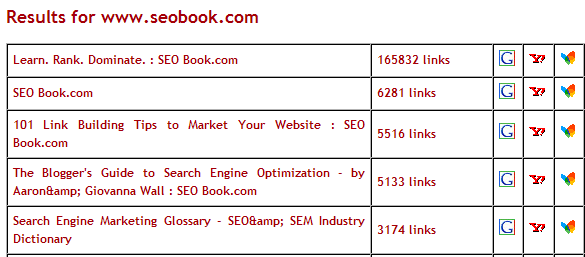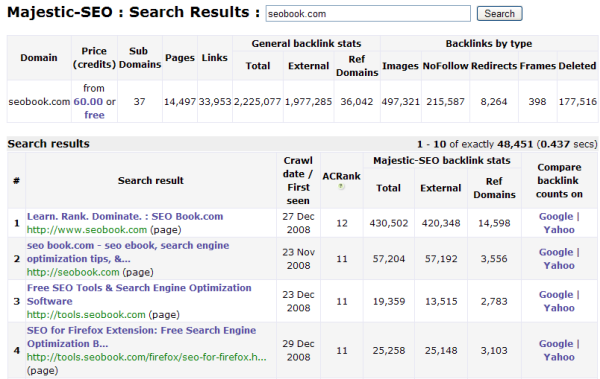A Spring Clean For SEO, Even Though It's Winter

An SEO strategy is an organic process.
Your SEO campaign should change focus as your popularity grows. The SEO approach for an established site can be quite different to that of a new site, mainly because, with an established site, you can leverage the power of your inbound linking.
Google favors the already "rich". The Google algorithm reinforces the establishment. If your site has become "the establishment", you may only need to work with Google, rather than against them, and high rankings should be yours with little comparative effort.
So, how often do you revise your SEO strategy? How often do you tweak and review old content? Has your SEO strategy become a little broken over the years? Try to make an audit part of your SEO process.
A spring clean for SEO :)
Here are a few ideas on what aspects to review in an SEO audit.
1. Aggressive / Non Aggressive
Are there areas on your site where you pushed the boundaries? Did this pay off? Does it still pay off? Have you used SEO strategy that worked well in the past, but the algorithms have since changed? As a site becomes more established, aggressive strategy becomes less necessary. It can also cause credibility problems.
What do I mean by aggressive?
Let's consider SEO copywriting. Sometimes, people go overboard with their copy. They cram their copy with keywords, which can often result in a page which reads poorly. The webmaster was trying to achieve high keyword density scores, and took it a little too far. In light of the weight now given to inbound links in the algorithms, this is pretty much a redundant tactic.
Do you know how much thought we give to on-page keywords in the copy at SEOBook.com?
Very little.
SEOBook.com ranks highly, for thousands of competitive keywords, because of the number and quality of the inbound links. We write on topics that we think will interest our readers. Long term credibility outweighs any limited benefit we'd get from aggressive on-page SEO tactics.
Weigh the need for aggressive tactics vs the benefit.
2. Untrustworthy Design & Format
When someone arrives at your page from a search, does your page look credible? Does it answer the search query? Does it convince people to take a desired action?
Check your pages for the basics. Check grammar, spelling and make sure the call to action is clear.
Is it time for a fresh design?
3. Re-balance Your Linking
Where are all your links coming from? Are they all reciprocal? Are they all coming from a narrow range of sites?
Look to diversify your linking patterns. Are most of the links pointing to your home page? You should have external deep links pointing to internal pages, too.
Stuntdbl has a great post on link balancing:
Examples of Link Equation Balancing:
(or If your site has….You should:)
* 1000 IBL’s from 500 unique IP’s…
…consider buying a run of site text link with your targeted text
* 70% reciprocal link…
…only get one-way links and slowly dispose of your reciprocal links
* 10k IBL’s from 10 unique IP’s…
…get many more one-off links
* 90% deeplinks to the homepage…
…compartmentalize your site and get more deep links
* 80% identical anchor text…
…use synonymous terms and switch your anchor text
"
4. Duplicate Content
Duplicate content can cause you problems, because the Google algorithm disqualifies same or similar content, in order to provide a diverse set of results.
Google provides a useful checklist for reviewing and eliminating duplicate content.
5. Forming & Maintaining Alliances
Is part of your SEO strategy to form alliances? Alliances are important because they extend your marketing reach, and provide you with links. Hook up with suppliers, vendors, partners, the local chamber of commerce, etc. Networking, quite naturally, results in links.
How often are you forming new alliances? Have you neglected any old alliances?
6. You Wrote Something Remarkable, But No One Noticed
If you've got remarkable content, you deserve links and attention. But what if you've been over-looked?
This is a perennial problem, and it is difficult to solve. People are short of time, and there is a lot of content fighting for attention.
One way is to go where the action is. Part of your SEO strategy should be involving yourself in the community, and if that means posting on other peoples sites, particularly the big community sites in your niche, then that's what you do.
Provide genuine value to those sites. Rewrite your article, put a fresh spin on it, and place it on those sites, if possible. So long as you get people's attention, and they follow the links back to you, then all is well.
Sure, you lose a level of control. But the alternative is to remain invisible.
7. Adwords Experiments
Are your title tags and descriptions all they could be? Are they optimized for maximum visitor response? How would you know?
One was is to run an Adwords test. Take the title and description from your high ranking SEO pages, and run an Adwords campaign using slight variations. This way, you can explore more enticing title and description tags, without compromising your rankings. Consider changing you title and descriptions, or write new pages, if the Adwords copy provides equivilent or better results.
8. Balance Content Writing And Link Building
A successful SEO campaign needs both. You need to weigh your time between the two, depending on where you get the best results. Linking is always worthwhile, but if there's not much on your site worth linking to, then you've got a problem.
Have you noticed a pattern of linking? For example, when you produce new articles, certain sites have a habit of linking to you? Look to monitor, cultivate and nurture those relationships.
What topics have typically earned you the most links? Do you need to adjust your focus?
These tools should help:
Link Analysis Tool, BlogStormUK

This tool requires you to install it and set up a MySQL database, but lets you:
- Uses Yahoo Site Explorer to find all pages on a site
- Pulls in link data for every page on the site & orders results by pages with the most links
- Allows you to drill down 2 levels deep into the link data for pages linking to the target site
- Accepts Google sitemaps imports
- Accepts single URL imports
- Lets you check the rankings for any page on any search engine
Also try this one: Majestic SEO/Anchor Index Search

Anchor Index is a very big (350 bln+ unique) web based database of urls from all over the web with identified backlinks, anchor text and some flags from pages (52 bln) that were crawled, analysed, indexed and finally merged into the index that can be queried. Search for a site, and it will give you backlink counts on a per URL basis - free of charge! If you want deeper data they sell per site reports on a per credit basis...giving you the anchor text of 10,000's of backlinks, whereas most other tools limit you to the top 1,000 links.
New to the site? Join for Free and get over $300 of free SEO software.



Once you set up your free account you can comment on our blog, and you are eligible to receive our search engine success SEO newsletter.
Already have an account? Login to share your opinions.




Comments
Add new comment